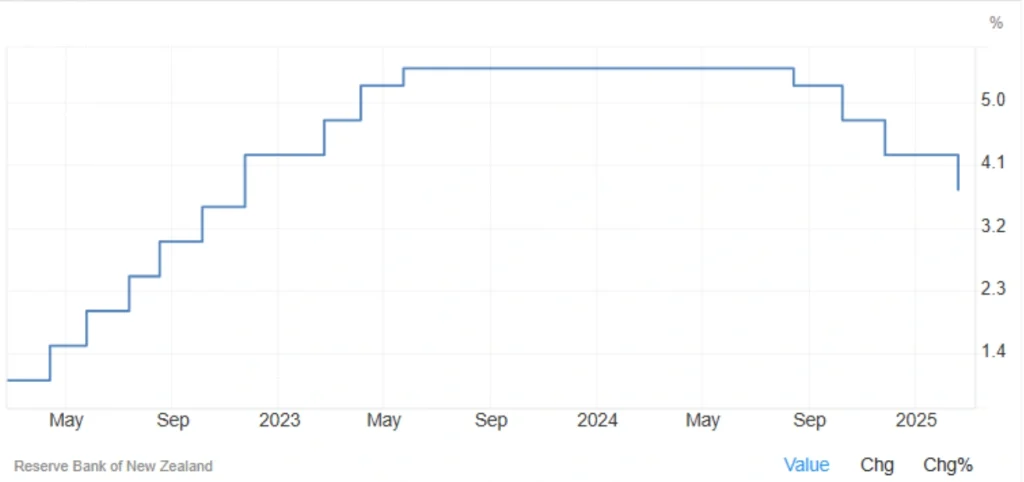
New Zealand Lowers Interest Rates as Economic Growth Slows
The Reserve Bank of New Zealand (RBNZ) has cut its Official Cash Rate (OCR) by 50 basis points, bringing it down to 3.75 percent in its February 2025 policy meeting. This move, widely anticipated by the market, follows a similar reduction in the previous meeting. With borrowing costs now at their lowest level since late 2022, the central bank aims to support an economy struggling with weak growth, declining labor demand, and easing inflation.
Economic Landscape and Key Changes
Inflation Eases to Target Range
New Zealand’s annual inflation rate fell to 2.2 percent in Q4 2024, marking its lowest level since March 2021. The decline suggests that price pressures are moderating, giving the central bank room to adjust monetary policy.
Prolonged Weak Growth
The country’s GDP has contracted for five consecutive quarters through September 2024 compared to the previous year. This persistent downturn highlights ongoing economic struggles and the need for policy intervention.
Slower Wage Growth and Labor Market Weakness
A cooling labor market has led to reduced demand for workers, slowing wage growth. This trend raises concerns about consumer spending power and overall economic stability.

Why the Rate Cut Matters
Lower Borrowing Costs for Businesses and Households
A reduction in interest rates makes borrowing more affordable. Businesses may take on new investments, and households could increase spending, both of which help stimulate economic activity.
Potential Boost for Economic Growth
Easier access to credit can encourage spending and investment, supporting GDP growth. However, the effectiveness of this strategy depends on broader economic conditions and consumer confidence.
Impact on Employment and Wages
While lower interest rates can stimulate business expansion, a sluggish economy may still lead to job losses and slower wage growth. Policymakers will need to balance monetary easing with long-term labor market stability.
Asset Market Implications
Lower interest rates often lead to higher stock and real estate prices as investors seek better returns in riskier assets. This can create opportunities but also risks, particularly if asset prices become overinflated.
Read More: New Zealand Balance of Trade
Understanding the RBNZ’s Decision
What is the Official Cash Rate?
The OCR is the benchmark interest rate that the central bank sets for lending to commercial banks. It influences interest rates on mortgages, business loans, and consumer credit, shaping overall economic activity.
How Does a Rate Cut Affect the Economy?
- Cheaper loans: Households and businesses can borrow at lower costs, potentially increasing spending and investment.
- Stimulus for growth: Lower rates encourage borrowing and economic activity, which can help lift GDP.
- Stock and property market effects: Investors may shift to equities and real estate, driving up asset prices.
- Inflation risks: Prolonged monetary easing could reignite inflation if demand outpaces supply.
Why Did the RBNZ Cut Rates?
- Economic growth remains weak.
- Inflation has returned to a manageable range.
- The labor market shows signs of strain, with slower wage growth and reduced hiring.
What’s Next for New Zealand’s Economy?
The RBNZ’s latest rate cut signals its commitment to stabilizing the economy amid slowing growth and weakening labor demand. If these trends continue, further policy easing may be on the horizon. Businesses, investors, and policymakers will need to closely monitor economic indicators, employment trends, and future central bank actions to navigate the evolving financial landscape.
Share
Hot topics

Best broker for gold trading
There’s always been a certain magic about gold. Before online charts and trading applications, people stored their wealth in coins and bars, trusting that gold would retain its value during...
Read more




Submit comment
Your email address will not be published. Required fields are marked *